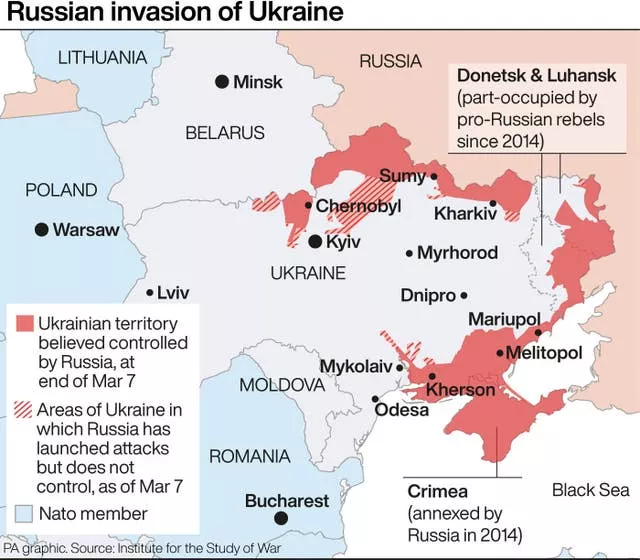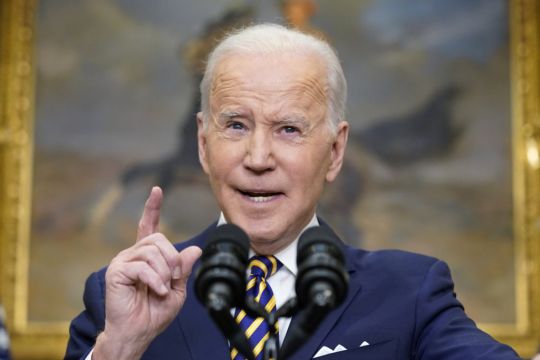Joe Biden has announced the US will ban all Russian oil imports, toughening the toll on Russia’s economy in retaliation for its invasion of Ukraine, but he acknowledged it will bring costs to Americans, particularly at the petrol pump.
The action follows pleas by Ukrainian President Volodymyr Zelensky to western officials to cut off the imports, which had been a glaring omission in massive sanctions put in place on Russia.
Energy exports have kept a steady stream of cash flowing to Russia despite otherwise severe restrictions on its financial sector.
“We will not be part of subsidising Putin’s war,” Mr Biden said, calling the new action a “powerful blow” against Moscow’s ability to fund the offensive.
He warned that Americans will see rising prices, saying: “Defending freedom is going to cost.”
The US president said the US was acting in close consultation with European allies, who are more dependent on Russian energy supplies.
The European Union will this week commit to phasing out its reliance on Russia for energy needs as soon as possible, but filling the void without crippling EU economies is likely to take some time.
Unlike the US, which is a major oil and gas producer, Europe relies on imports for 90% of its gas and 97% of its oil products. Russia supplies 40% of Europe’s gas and a quarter of its oil. The US does not import Russian natural gas.

The issue of oil sanctions has created a conflict for the president between political interests at home and efforts to impose costs on Russia. Though Russian oil makes up only a small part of US imports, Mr Biden had said he was reluctant to ban it, cutting into supplies here and pushing petrol prices higher.
US inflation is at a 40-year peak, fuelled in large part by fuel prices, and that could hurt Mr Biden heading into the November mid-term elections.
Prices have been rising for weeks due to the conflict and in anticipation of potential sanctions on the Russian energy sector. The average price for a gallon of petrol in the US hit a record 4.17 dollars (£3.18) on Tuesday, according to auto club AAA.
Even before the US ban many western energy companies including ExxonMobil and BP moved to cut ties with the Russia and limit imports. Shell, which purchased a shipment of Russian oil this weekend, apologised for the move on Tuesday amid international criticism and pledged to halt further purchases of Russian energy supplies.
Preliminary data from the US Energy Department shows imports of Russian crude dropped to zero in the last week in February.
In 2021, the US imported roughly 245 million barrels of crude oil and petroleum products from Russia.
RePowerEU will diversify our gas supplies, speed up the renewable roll-out, improve energy efficiency and replace gas in heating and power.
It can reduce our demand for Russian gas by 2/3 before the end of the year. pic.twitter.com/kzVNJLPmt6— Ursula von der Leyen (@vonderleyen) March 8, 2022
The 27 EU leaders will meet near Paris for a two-day summit from Thursday and will be working on ways to reduce their dependency on Moscow for fossil fuels.
“We agreed to phase out our dependency on Russian gas, oil and coal imports,” said a draft of the summit declaration.
The European Commission already has proposals to make it happen, including diversifying natural gas supplies and speeding up renewable energy development.
The EU’s executive arm said its measures “can reduce EU demand for Russian gas by two-thirds before the end of the year”.
“We must become independent from Russian oil, coal and gas,” commission president Ursula von der Leyen said in a statement. “We simply cannot rely on a supplier who explicitly threatens us.”
The EU imports 90% of the natural gas used to generate electricity, heat homes and supply industry, with Russia supplying almost 40% of EU gas and a quarter of its oil.
In the UK, Business Secretary Kwasi Kwarteng announced the UK will phase out the import of Russian oil and oil products by the end of the year as part of a ratcheting up of sanctions on Moscow.







